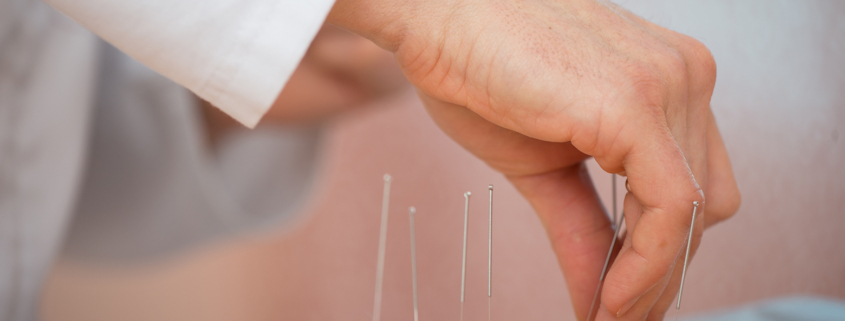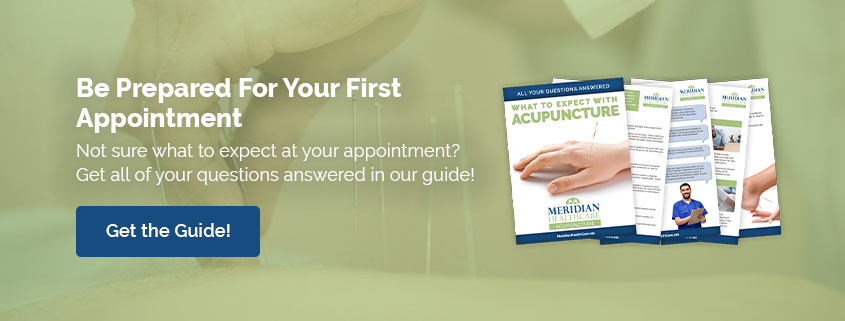Acupuncture: An Overview
Acupuncture is an ancient Chinese practice that involves inserting very thin needles at specific points on the body. The U.S. National Institute of Health (NIH) says that acupuncture is often used for chronic pain.
Acupuncture has been used for thousands of years to treat a wide range of health conditions, from back pain and migraines to allergies and skin problems. It can also help treat anxiety and depression, as well as certain painful symptoms that occur with cancer treatment. Acupuncture needles stimulate specific points along the body known as acupoints, and after being inserted into the body, these needles can be moved or twirled to stimulate the desired acupoint.
The general theory of acupuncture is based on the premise that there are patterns of energy flow (qi – pronounced “chee”) through the body that are essential for health. Disruptions of this flow are believed to be responsible for disease. Acupuncture may, it has been theorized, correct imbalances of the flow of qi at identifiable points close to the skin. Practitioners in Western culture view the acupuncture points as places to stimulate the body’s nervous system, blood flow, and connective tissues, and that this stimulation boosts the body’s natural painkillers, known as endorphins.
In traditional Chinese medicine, there are more than 2,000 acupuncture points in the human body that connect with 12 main and eight secondary meridians, which are pathways through which vital energy known as qi circulates. The energy collects in “pools” all over the body, and these “pools” are the points that are accessed by the needles as they are inserted. Chinese medicine believes that with acupuncture, flow is restored to its proper state, allowing the organs and body to function properly.
Western medicine has focused on acupuncture’s ability to relieve pain, but in traditional Chinese medicine, acupuncture is seen as a regular treatment that patients undergo on a regular basis in the belief that it helps to maintain good energy flow throughout the body.
Acupuncture for Pain Relief
Acupuncture is a popular alternative therapy. Although it’s not intended to help treat a specific disease or condition, traditional acupuncture (as opposed to cosmetic surgery-type acupuncture) is often used to treat chronic pain and musculoskeletal problems:
- Dental pain
- Osteoarthritis
- Tension headaches and migraines
- Menstrual cramps
- Low back pain
Acupuncture and Infertility
Infertility is described as an inability for a sexually active couple to conceive for one year. It affects 8-12% of couples in the world, and this number is rising, especially in the developed world.
Acupuncture may help with issues such as stress relief, hormonal imbalances, and blood flow to the reproductive organs, all of which can affect fertility in men and women. However, more research is needed to fully understand acupuncture’s role in infertility treatment. Most reproductive experts agree that success is best achieved when acupuncture is paired with modern infertility treatments.
How Acupuncture is Performed
During treatment, an acupuncturist inserts very fine, thin needles through the skin.
Acupuncture needles are typically made of stainless steel and range in length from 13 to 130 millimeters (mm) (0.5 to 5 inches). The needles are flexible – they bend as they are inserted into the skin. They have a rounded or flat tip and can be inserted from 1/16 inch (1.6 mm) to several inches deep into the body depending on which points are being stimulated. (Acupuncture needles are slightly thicker than a strand of human hair.)
In addition to needles, practitioners may apply other forms of stimulation to the needles, such as heat (moxibustion), mild electrical stimulation, or manual manipulation of the needles by twirling them.
Although acupuncture is generally safe when administered correctly by an experienced practitioner using sterile needles, adverse side effects associated with acupuncture have been reported, including infections; however, serious adverse events appear to be rare.
Risks and Side Effects of Acupuncture Treatment
Acupuncture is considered safe when performed by an experienced, well-trained practitioner using sterile, single-use needles. The United States Food and Drug Administration requires that disposable needles be used only once. Risks of acupuncture are extremely rare. However, you may experience some minor symptoms after the treatment.
Different patients experience different sensations, but most individuals feel no pain when the needles are inserted, only a sight warming or tingling sensation at the site of insertion. If you do experience a high level of pain, you should notify the acupuncturist so that they can adjust the position of the needle. There may be a dull ache at the site when the needles are removed, which usually resolves itself within a few minutes or hours.
Possible Acupuncture Complications
Acupuncture may not be right for you if you have a pacemaker or another electrical device implanted in your body. Other complications may include dizziness, fatigue, nausea, and bleeding or bruising at the site where the needles were inserted.
In rare cases, needles can break off in the skin and lead to infection. These are extremely rare side effects, but every medical procedure carries certain risks.
Who Should Not Receive Acupuncture?
Acupuncture is not safe for everyone. Do not seek acupuncture treatment if you have a bleeding disorder or if you are taking blood thinners. Pregnant women can undergo acupuncture treatment, but it’s important to understand potential risks associated with the therapy, since some forms of acupuncture can possibly stimulate labor and cause premature delivery.
Infants and very young children are typically not suitable patients for acupuncture, as well as very weak or elderly patients. Those with severe anxiety or a fear of needles should not undergo acupuncture treatment, as well as those with a compromised immune system.
Some patients may experience noticeable changes in bowel and bladder activity following acupuncture treatment, as well as changes in sleep and appetite. These changes are normal for many patients and usually resolve within a few days.
Preparing for Your Acupuncture Treatment
1. First and foremost, find a licensed practitioner. To find a qualified acupuncturist in your area, ask your doctor for a recommendation or contact a reputable health organization that certifies acupuncturists.
In the United States, the National Certification Commission for Acupuncture and Oriental Medicine provides certification. You can also check with your state’s medical board to see whether acupuncturists are licensed in your state and to confirm their credentials.
2. Second, inquire about training. Your acupuncturist should be able to tell you about his or her training and experience in the field. Keep in mind that not all states require acupuncturists to be licensed, so training and experience may vary.
3. Third, make sure your acupuncturist uses disposable needles. Your acupuncturist typically will open a new package of needles in front of you before beginning the procedure. The treatment should occur in a clean, sanitary healthcare setting.
4. Fourth, consult with your insurance provider to see if acupuncture is covered. Some insurance providers cover it, while others might only cover it after a recommendation from your primary care provider. Others may not cover it at all, so do your research beforehand.
The Day of Your Acupuncture Treatment
Wear loose-fitting, comfortable clothing to your acupuncture appointment so you can easily roll up sleeves or trouser legs. Don’t arrive hungry, but don’t eat a large meal beforehand either. A small snack before and after your treatment is fine. Patients should also avoid alcoholic beverages for 6 hours before and after an acupuncture session.
If possible, plan your day so that you can rest after your treatment. This will help to extend the energizing and relaxing effects of the treatment. Hard exercise or physical exertion should also be avoided for the remainder of the day after acupuncture treatment. Continue to take your prescription medications as directed by your primary care provider. It’s helpful to keep a journal of your response to the treatment – this will assist your acupuncturist in planning future treatments.
What Happens During An Acupuncture Session
During your first session, you will be asked to fill out paperwork describing your health concerns. You will have a consultation with the acupuncturist to discuss your symptoms, health history, and lifestyle. Then the acupuncturist will examine you to make an accurate diagnosis. This may include questioning you about your sleep habits, energy level, and appetite. The acupuncturist may also check your tongue’s shape, color, and coating, feel your pulse at various places on the body and observe your skin condition.
Your acupuncturist will identify the points on your body where you need treatment and then insert very thin needles into these points. Acupuncture treatments usually last between 20 and 45 minutes, with sessions rarely lasting longer than 60 minutes.
You’ll need to lie still during the treatment, but you won’t be asleep or unconscious. It’s normal for some people to experience a sensation of deep relaxation or even mild sedation during and after acupuncture sessions.
The number of needles used during treatment varies, depending on the condition being treated. Typically, acupuncture involves between five and 20 needles. Afterward, your acupuncturist may recommend that you continue treatment at home by stimulating specific pressure points with your fingers — a practice known as acupressure.
The number of treatments required for pain relief and improvement of overall well-being varies between patients. Typically, four to six acupuncture sessions are performed to achieve the maximum benefit. These sessions will often take place at a rate of once a week.
Benefits of Acupuncture Treatment
After your acupuncture treatment, many patients feel relaxed while others might feel a surge of energy. If your symptoms don’t start to improve after a few sessions, acupuncture may not be the treatment for you.
Several studies have suggested that acupuncture may help relieve pain. For example, one 2015 review concluded that acupuncture may help osteoarthritis knee pain and chronic shoulder, back or neck pain.
In a 2019 systematic review of studies involving almost 30,000 people with fibromyalgia, those who received acupuncture had less pain and improved quality of life compared with those who received placebo treatment.
Do I Need Acupuncture Treatment?
You should discuss the possibility of acupuncture with your primary care provider first, as he or she will have the most information about your health. Your doctor will know if your particular condition can benefit from acupuncture treatment. You should not rely on a diagnosis solely from an acupuncture provider.
Talk to your primary care provider about whether or not the use of acupuncture is a good part of your treatment plan, particularly if you’re pregnant or trying to conceive, have high blood pressure, feel queasy in a recliner, use drugs that interact with sedatives and/or pain medication or have an infection.
Acupuncture is best considered a complementary treatment that can be used alongside other forms of treatment to reduce pain.
Acupuncture Can Help You Live Without Pain
Exactly why acupuncture works for so many individuals is still being studied. Whether the benefits of acupuncture come from stimulation of the body’s immune system, manipulation of the body’s life force, or are just a placebo effect, many have experienced wellness and freedom from pain due to acupuncture treatment.
Acupuncture can keep those with chronic pain from having to rely on drugs and risk the possibility of addiction. If someone you know is abusing pain medication, there is help available. Contact Meridian HealthCare today and get on the path to reclaiming your life.





